
A telephone is a telecommunications device that permits two or more users to conduct a conversation when they are too far apart to be easily heard directly. A telephone converts sound, typically and most efficiently the human voice, into electronic signals that are transmitted via cables and other communication channels to another telephone which reproduces the sound to the receiving user. The term is derived from Greek: τῆλε and φωνή, together meaning distant voice. A common short form of the term is phone, which came into use early in the telephone's history. Nowadays, phones are almost always in the form of smartphones or mobile phones, due to technological convergence.

In telecommunications, an acoustic coupler is an interface device for coupling electrical signals by acoustical means—usually into and out of a telephone.

Caryn Elaine Johnson, known professionally as Whoopi Goldberg, is an American actor, comedian, author, and television personality. A recipient of numerous accolades, she is one of 19 entertainers to win the EGOT, which includes an Emmy Award, a Grammy Award, an Academy Award, and a Tony Award. In 2001, she received the Mark Twain Prize for American Humor.
Guinan is a recurring character in the Star Trek franchise, portrayed by American actress Whoopi Goldberg. The character first appeared in the television series Star Trek: The Next Generation and went on to appear in Star Trek: Picard and the films Star Trek Generations and Star Trek: Nemesis. She was also played as a child by Isis Carmen Jones in the episode "Rascals" and a younger version of the character by Ito Aghayere in Picard.

Ghost is a 1990 American supernatural romance film directed by Jerry Zucker from a screenplay by Bruce Joel Rubin, and starring Patrick Swayze, Demi Moore, Whoopi Goldberg, Tony Goldwyn, Vincent Schiavelli, and Rick Aviles. It focuses on Sam Wheat (Swayze), a murdered banker, whose ghost sets out to save his girlfriend, Molly Jensen (Moore), from the person who killed him – through the help of the psychic Oda Mae Brown (Goldberg).
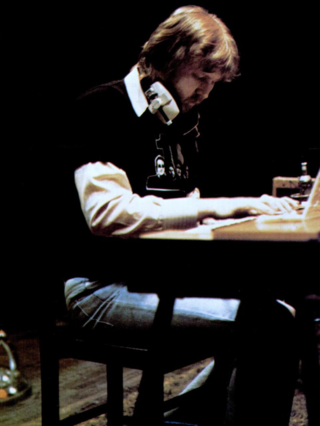
Harry Edward Nilsson III, sometimes credited as Nilsson, was an American singer-songwriter who reached the peak of his success in the early 1970s. His work is characterized by pioneering vocal overdub experiments, a return to the Great American Songbook, and fusions of Caribbean sounds. Nilsson was one of the few major pop-rock recording artists to achieve significant commercial success without performing major public concerts or touring regularly.

A blue box is an electronic device that produces tones used to generate the in-band signaling tones formerly used within the North American long-distance telephone network to send line status and called number information over voice circuits. This allowed an illicit user, referred to as a "phreaker", to place long-distance calls, without using the network's user facilities, that would be billed to another number or dismissed entirely as an incomplete call. A number of similar "color boxes" were also created to control other aspects of the phone network.

The Trimline telephone is a series of telephones that was produced by Western Electric, the manufacturing unit of the Bell System. These telephones were first introduced in 1965 and are formally referred to as the No. 220 Hand Telephone Sets. The Trimline was designed by Henry Dreyfuss Associates under the project direction of Donald Genaro; the firm had produced the previous post-war desktop telephone types for the American Telephone & Telegraph Company.

A telephone call or telephone conversation, also known as a phone call or voice call, is a connection over a telephone network between the called party and the calling party. Telephone calls started in the late 19th century. As technology has improved, a majority of telephone calls are made over a cellular network through mobile phones or over the internet with Voice over IP. Telephone calls are typically used for real-time conversation between two or more parties, especially when the parties cannot meet in person.

Elmore Rual "Rip" Torn Jr. was an American actor whose career spanned more than 60 years. He was nominated for the Academy Award for Best Supporting Actor for playing Marsh Turner in Cross Creek (1983). Torn's portrayal of Artie the producer on The Larry Sanders Show received six Emmy Award nominations, winning in 1996. He also won an American Comedy Award for Funniest Supporting Male in a Series, and two CableACE Awards for his work on the show. Torn is also known for his roles as Zed in the Men in Black franchise (1997–2002) and Patches O'Houlihan in Dodgeball: A True Underdog Story (2004).
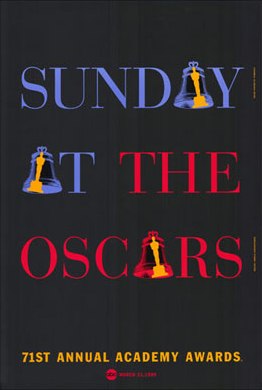
The 71st Academy Awards ceremony, organized by the Academy of Motion Picture Arts and Sciences (AMPAS), honored the best of 1998 in film and took place on March 21, 1999, at the Dorothy Chandler Pavilion in Los Angeles beginning at 5:30 p.m. PST / 8:30 p.m. EST. During the ceremony, AMPAS presented Academy Awards in 24 categories. The ceremony, televised in the United States by ABC, was produced by Gil Cates and directed by Louis J. Horvitz. Actress Whoopi Goldberg hosted the show for the third time. She first hosted the 66th ceremony held in 1994 and had last hosted the 68th ceremony in 1996. Nearly a month earlier in a ceremony held at the Regent Beverly Wilshire Hotel in Beverly Hills, California on February 27, the Academy Awards for Technical Achievement were presented by host Anne Heche.
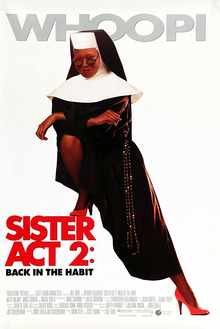
Sister Act 2: Back in the Habit is a 1993 American musical comedy film, directed by Bill Duke, and released by Touchstone Pictures. It is the sequel to the 1992 film Sister Act, and is loosely based on the life of Crenshaw High School choir instructor Iris Stevenson. The story sees Whoopi Goldberg reprising her role as Deloris van Cartier, as she finds herself coming to the aid of her nun friends who need her help to save her old school. Maggie Smith, Kathy Najimy, Wendy Makkena, and Mary Wickes also reprised their roles in the sequel.
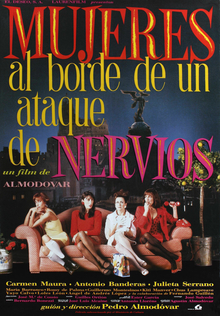
Women on the Verge of a Nervous Breakdown is a 1988 Spanish black comedy film written and directed by Pedro Almodóvar, starring Carmen Maura, Antonio Banderas and Julieta Serrano. The plot follows actress Pepa, who, after her lover Iván leaves without explanation, sets out to find the reason, and comes across an array of eccentric characters, including Iván's son from a previous relationship and her best friend Candela, who has been held captive by a Shiite terrorist cell.
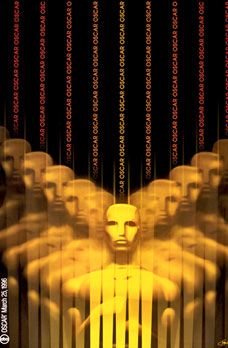
The 68th Academy Awards ceremony, organized by the Academy of Motion Picture Arts and Sciences (AMPAS), honored the best films of 1995 in the United States and took place on March 25, 1996, at the Dorothy Chandler Pavilion in Los Angeles beginning at 6:00 p.m. PST / 9:00 p.m. EST. During the ceremony, AMPAS presented Academy Awards in 24 categories. The ceremony, televised in the United States by ABC, was produced by David Salzman and Quincy Jones and directed by Jeff Margolis. Actress Whoopi Goldberg hosted the show for the second time, having previously presided over the 66th ceremony in 1994. Three weeks earlier, in a ceremony held at the Regent Beverly Wilshire Hotel in Beverly Hills, California, on March 2, the Academy Awards for Technical Achievement were presented by host Richard Dreyfuss.
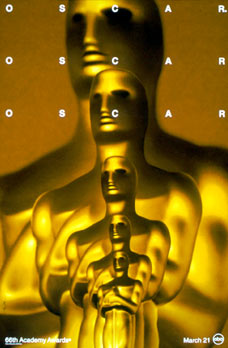
The 66th Academy Awards ceremony, organized by the Academy of Motion Picture Arts and Sciences (AMPAS), honored films released in 1993 and took place on March 21, 1994, at the Dorothy Chandler Pavilion in Los Angeles beginning at 6:00 p.m. PST / 9:00 p.m. EST. During the ceremony, AMPAS presented Academy Awards in 23 categories. The ceremony, televised in the United States by ABC, was produced by Gil Cates and directed by Jeff Margolis. Actress Whoopi Goldberg hosted the show for the first time. This ceremony was the first to present the annual In Memoriam tribute. Nearly a month earlier in a ceremony held at The Beverly Hilton in Beverly Hills, California on February 26, the Academy Awards for Technical Achievement were presented by host Laura Dern.

How Stella Got Her Groove Back is a 1998 American romantic comedy-drama film directed by Kevin Rodney Sullivan, adapted from Terry McMillan's best-selling 1996 novel of the same title. The film stars Angela Bassett, Taye Diggs, Whoopi Goldberg, and Regina King. The original music score was composed by Michel Colombier.
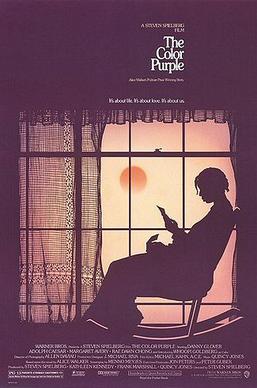
The Color Purple is a 1985 American epic coming-of-age period drama film directed by Steven Spielberg and written by Menno Meyjes. It is based on the Pulitzer Prize–winning 1982 novel of the same name by Alice Walker and was Spielberg's eighth film as a director, marking a turning point in his career as it was a departure from the summer blockbusters for which he had become known. It was also the first feature film directed by Spielberg for which John Williams did not compose the music, instead featuring a score by Quincy Jones, who also produced. The film stars Whoopi Goldberg in her breakthrough role, with Danny Glover, Oprah Winfrey, Margaret Avery, and Adolph Caesar.

Eddie is a 1996 American sports comedy film starring Whoopi Goldberg and Frank Langella. The film was directed by Steve Rash.

Jumpin' Jack Flash is a 1986 American spy comedy film starring Whoopi Goldberg. The film was directed by Penny Marshall in her theatrical film directorial debut. The soundtrack has two versions of the song "Jumpin' Jack Flash": the original by the Rolling Stones, and a remake by Aretha Franklin in the end credits. Franklin's version was not on the film's soundtrack album but was released as a single.
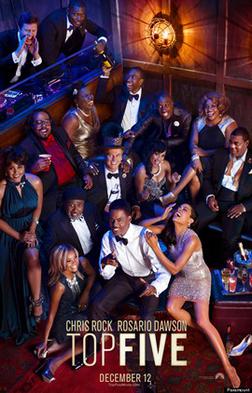
Top Five is a 2014 American comedy film written and directed by Chris Rock. Produced by Scott Rudin and Eli Bush, the film stars Rock, Rosario Dawson, and Gabrielle Union, and follows New York City comedian and film star Andre Allen (Rock), who has to confront his past and comedic career while doing an interview with journalist Chelsea Brown (Dawson).



















